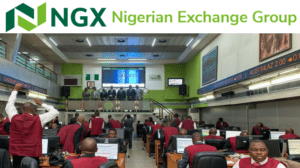Equities market drops by N1.36trn in Feb
By Kayode Tokede
Following investors profit-taking in banks shares, Industrial goods, among others, investors on equities market segment of the Nigerian Stock Exchange (NSE) lost N1.36trillion in February.
The NSE in February was not immune to the rout in global equities as the market suffered its fourth consecutive weekly loss, amid growing concerns about the rising yields in the money market instrument.
Again, the NTB auction results wherein stop rates rose by an average of 254bps to 3.67per cent (from 2.33 per cent at the last auction) also weighed on investors sentiment on the NSE.
February has been turbulent for investment as the exchange confronted headwinds from internal vulnerabilities like profit-taking, market correction as well as pressure from less-than-impressive earnings reports.
Our correspondent gathered that the NSE market capitalization closed on Friday at N20.832 trillion, N1.36trillion from N22.187 trillion it opened for trading.
Also, the NSE All-Share Index dropped by 2,612.77 basis points or 6.16 per cent to close at 39,799.89 basis points from 42,412.66 basis points the market opened for trading in February.
With the decline, the equities market performance in its Year-Till-Date closed at 1.17per cent.
Our correspondent also gathered that NSE Insurance index performed worst in Feburary, dropping by 17.82 per cent to 202.09 basis points.
NSE Banking Index dropped by 9.73 per cent to 382.76 basis points while NSE Lotus II and NSE Industrial good index dropped by 6.12 per cent and 8.80 per cent respectively.
On the flip side, NSE Oil /Gas gained 4.36 per cent to 265.30 basis points in February.
Capital market analysts stated that February performance of the NSE is a reflection of investors swing fo money market instruments, stressing that dwindling yields over the time had sustained the equities market growth.
Speaking on market performance for January, the head of research, PanAfrican Capital Holdings Limited, Moses Ojo said the modest yield environment in the money market instrument drive equities market performance in February, stressing that the trend might not continue towards the end of first quarter.
The managing director/CEO of APT Securities and Funds Limited, Mallam Garba Kurfi, also said, “As long as low yield in the money market persist, we will continue to have liquidity in the capital market.
APT Securities and Funds expected the equities market to have a gradual rise in prices over the course of the year, said, that “The outstanding performance recorded by the market in the previous year would not likely repeat itself.
“Hence, we would continue to advice investors to take position in fundamentally sound stocks with good growth prospects.”
The Chief Operating Officer of InvestData Consulting Limited, Mr Ambrose Omordion had predicted that, “the equities market is to witness volatility, even as the outlook remains mixed due to likely price corrections, or pullbacks for a few days due to profit taking and portfolio reshuffling ahead of year-end and 2021 corporate actions.
“The anticipated correction will strengthen recovery. Despite the rising inflation, insecurity and the second wave of coronavirus, as this wave will further boost the healthcare sector due to government and CBN commitment to enhance public health.”
He added that the current breakouts of resistance levels offer traders opportunities to position for the short term, while investors should target fundamentally sound, and dividend-paying stocks for possible dividend income and capital growth.
Investors, deal-makers and brokers will approach March with cautious optimism on account of the current downturn and a 14 per cent slide in the 2020 profit of Nigeria’s biggest food and consumer goods company, Nestle, as its financials showed on Friday. The consumer goods index is down 1.66 per cent this year already.




